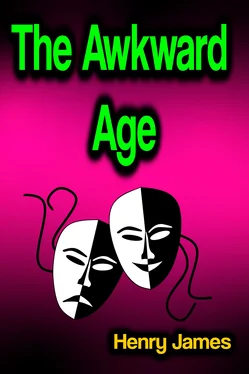HENRY JAMES.
Part 1 Lady Julia
Chapter
1
Save when it happened to rain Vanderbank always walked home, but he usually took a hansom when the rain was moderate and adopted the preference of the philosopher when it was heavy. On this occasion he therefore recognised as the servant opened the door a congruity between the weather and the "four-wheeler" that, in the empty street, under the glazed radiance, waited and trickled and blackly glittered. The butler mentioned it as on such a wild night the only thing they could get, and Vanderbank, having replied that it was exactly what would do best, prepared in the doorway to put up his umbrella and dash down to it. At this moment he heard his name pronounced from behind and on turning found himself joined by the elderly fellow guest with whom he had talked after dinner and about whom later on upstairs he had sounded his hostess. It was at present a clear question of how this amiable, this apparently unassertive person should get home—of the possibility of the other cab for which even now one of the footmen, with a whistle to his lips, craned out his head and listened through the storm. Mr. Longdon wondered to Vanderbank if their course might by any chance be the same; which led our young friend immediately to express a readiness to see him safely in any direction that should accommodate him. As the footman's whistle spent itself in vain they got together into the four- wheeler, where at the end of a few moments more Vanderbank became conscious of having proposed his own rooms as a wind-up to their drive. Wouldn't that be a better finish of the evening than just separating in the wet? He liked his new acquaintance, who struck him as in a manner clinging to him, who was staying at an hotel presumably at that hour dismal, and who, confessing with easy humility to a connexion positively timid with a club at which one couldn't have a visitor, accepted his invitation under pressure. Vanderbank, when they arrived, was amused at the air of added extravagance with which he said he would keep the cab: he so clearly enjoyed to that extent the sense of making a night of it. "You young men, I believe, keep them for hours, eh? At least they did in my time," he laughed—"the wild ones! But I think of them as all wild then. I dare say that when one settles in town one learns how to manage; only I'm afraid, you know, that I've got completely out of it. I do feel really quite mouldy. It's a matter of thirty years—!"
"Since you've been in London?"
"For more than a few days at a time, upon my honour. You won't understand that—any more, I dare say, than I myself quite understand how at the end of all I've accepted this queer view of the doom of coming back. But I don't doubt I shall ask you, if you'll be so good as to let me, for the help of a hint or two: as to how to do, don't you know? and not to—what do you fellows call it?—BE done. Now about one of THESE things—!"
One of these things was the lift in which, at no great pace and with much rumbling and creaking, the porter conveyed the two gentlemen to the alarming eminence, as Mr. Longdon measured their flight, at which Vanderbank perched. The impression made on him by this contrivance showed him as unsophisticated, yet when his companion, at the top, ushering him in, gave a touch to the quick light and, in the pleasant ruddy room, all convenience and character, had before the fire another look at him, it was not to catch in him any protrusive angle. Mr. Longdon was slight and neat, delicate of body and both keen and kind of face, with black brows finely marked and thick smooth hair in which the silver had deep shadows. He wore neither whisker nor moustache and seemed to carry in the flicker of his quick brown eyes and the positive sun-play of his smile even more than the equivalent of what might, superficially or stupidly, elsewhere be missed in him; which was mass, substance, presence—what is vulgarly called importance. He had indeed no presence but had somehow an effect. He might almost have been a priest if priests, as it occurred to Vanderbank, were ever such dandies. He had at all events conclusively doubled the Cape of the years—he would never again see fifty-five: to the warning light of that bleak headland he presented a back sufficiently conscious. Yet though to Vanderbank he couldn't look young he came near—strikingly and amusingly—looking new: this after a minute appeared mainly perhaps indeed in the perfection of his evening dress and the special smartness of the sleeveless overcoat he had evidently had made to wear with it and might even actually be wearing for the first time. He had talked to Vanderbank at Mrs. Brookenham's about Beccles and Suffolk; but it was not at Beccles nor anywhere in the county that these ornaments had been designed. His action had already been, with however little purpose, to present the region to his interlocutor in a favourable light. Vanderbank, for that matter, had the kind of imagination that likes to PLACE an object, even to the point of losing sight of it in the conditions; he already saw the nice old nook it must have taken to keep a man of intelligence so fresh while suffering him to remain so fine. The product of Beccles accepted at all events a cigarette—still much as a joke and an adventure—and looked about him as if even more pleased than he expected. Then he broke, through his double eye-glass, into an exclamation that was like a passing pang of envy and regret. "You young men, you young men—!"
"Well, what about us?" Vanderbank's tone encouraged the courtesy of the reference. "I'm not so young moreover as that comes to."
"How old are you then, pray?"
"Why I'm thirty-four."
"What do you call that? I'm a hundred and three!" Mr. Longdon at all events took out his watch. "It's only a quarter past eleven." Then with a quick change of interest, "What did you say is your public office?" he enquired.
"The General Audit. I'm Deputy Chairman."
"Dear!" Mr. Longdon looked at him as if he had had fifty windows. "What a head you must have!"
"Oh yes—our head's Sir Digby Dence."
"And what do we do for you?"
"Well, you gild the pill—though not perhaps very thick. But it's a decent berth."
"A thing a good many fellows would give a pound of their flesh for?"
Vanderbank's visitor appeared so to deprecate too faint a picture that he dropped all scruples. "I'm the most envied man I know—so that if I were a shade less amiable I should be one of the most hated."
Mr. Longdon laughed, yet not quite as if they were joking. "I see. Your pleasant way carries it off."
Vanderbank was, however, not serious. "Wouldn't it carry off anything?"
Again his friend, through the pince-nez, appeared to crown him with a Whitehall cornice. "I think I ought to let you know I'm studying you. It's really fair to tell you," he continued with an earnestness not discomposed by the indulgence in Vanderbank's face. "It's all right—all right!" he reassuringly added, having meanwhile stopped before a photograph suspended on the wall. "That's your mother!" he brought out with something of the elation of a child making a discovery or guessing a riddle. "I don't make you out in her yet—in my recollection of her, which, as I told you, is perfect; but I dare say I soon shall."
Vanderbank was more and more aware that the kind of amusement he excited would never in the least be a bar to affection. "Please take all your time."
Mr. Longdon looked at his watch again. "Do you think I HAD better keep it?"
"The cab?" Vanderbank liked him so, found in him such a promise of pleasant things, that he was almost tempted to say: "Dear and delightful sir, don't weigh that question; I'll pay, myself, for the man's whole night!" His approval at all events was complete.
"Most certainly. That's the only way not to think of it."
Читать дальше












